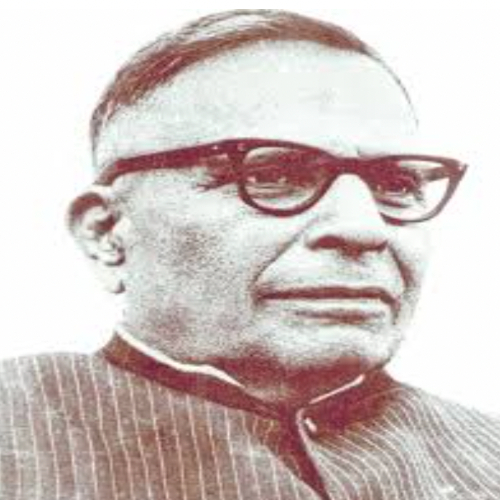Early Life
Harekrushna Mahatab, popularly known as “Utkal Keshari” was born on 21 November 1899 at Agarpara village in the Bhadrak district of Odisha. He was born into an aristocratic Khandayat family. He completed his matriculation from Bhadrak High School before moving to Ravenshaw College, Cuttack.
Role in India’s Independence Movement
Mahatab drew great inspiration from the likes of Mahatma Gandhi. After observing the INC’s sessions in 1920, he left his studies to actively participate in the independence movement in 1921.
He served as the Chairman of the Balasore District Congress Committee from 1924 to 1928 and also became a member of the Bihar and Odisha Council in 1924. In this role, he coordinated the boycott of foreign-made products in the Non-Cooperation Movement and was arrested for sedition.
In 1930, Mahatab was elected as the president of the Utkal Pradesh Congress Committee. He drew inspiration from Gandhi’s famous Dandi March and spearheaded a successful salt satyagraha in Orissa, for which he faced imprisonment in 1930. In 1932, he was elected the General Officer Commanding Congress Sevadal (the INC’s grassroots arm) and was arrested when the party was banned.
Mahatab famously participated in a movement against untouchability in 1934 and opened the gates of his ancestral temple in Odisha to all.
In 1938, Subhash Chandra Bose nominated Mahatab to the Congress Working Committee where he served till 1950. In the same year, he was also made the President of the State Peoples’ Enquiry Committee. He recommended the withdrawal of state support to the princely states and their merger with the Odisha Province. Further, he actively participated in the Quit India Movement in 1942, for which he was imprisoned in the Ahmednagar Fort Jail from 1942 to 1945.
Contribution to Constitution Making
Mahatab was elected to the Constituent Assembly from Orissa. He played a critical role in the integration of Odia-speaking Princely States into the province, but did not take part in the debates.
Later Contributions
Mahatab was the first Chief Minister of Orissa from 1946 to 1950, and again from 1956 to 1960. In this position, Mahatab is credited with formulating the modern-day contours of Odisha by steering the integration of 26 erstwhile Odia-speaking Princely States.
Soon after his election in 1946, Mahatab pressed for the merger of the erstwhile Princely States having a geographical, linguistic, and ethnological affinity with Orissa. This was met with strong resistance from the rulers, who set up the Eastern States Union. However, this union was short-lived. Faced with acute maladministration, the State of Nilgiri faced demands for accession to Orissa. After obtaining permission from the Centre, Mahatab seized control of the administration of Nilgiri in November 1947. The other States followed through shortly and agreed to sign the document of the merger as a result of Mahatab’s tactical negotiation.
Additionally, he was also instrumental in shifting the capital of Orissa from Cuttack to Bhubaneshwar and played a role in several infrastructural projects like the Hirakud Dam Project, Rourkela Steel Plant, and more.
From 1950-1952, Mahatab served as the Union Minister for Commerce and Industry. He played an important role in setting up various industries and was heavily influenced by Gandhi’s views on self-sufficiency. In 1952, he became the secretary general of the Congress Parliamentary Party and even served as the Governor of Bombay for a short period from 1955 to 1956.
In 1962, he was elected to the Lok Sabha from Angul and served as the Vice President of the INC in 1966. However, disenchanted by its left-leaning tendencies under Indira Gandhi, he left the INC and established the Orissa Jana Congress (OJC). The OJC had limited success, and formed a short-lived coalition government. Mahatab was imprisoned for opposing the 1975 Emergency. When the emergency was lifted, the OJC merged with the Janata Party in 1977.
Mahatab retired from active politics in 1977 and passed away on 2 January 1987.
Key Writings
Mahatab was a prolific writer who wrote various works during his time in prison. He penned a novel ‘Nutan Dharma’ and a drama ‘Swarajya Sadhana’ in his final stint in prison. He also authored the historical account History of Orissa. Notably, he set up the Oriya daily Prajatantra, in 1930 which remains in circulation even today. He also started a weekly journal Rachana, modeled on Gandhi’s weekly Harijan, with the aim of proliferating Gandhian discourse. He was the chief editor of Jhankar, a monthly journal, and also published and edited the Eastern Times. In 1983, he won the Sahitya Academy Award for his famous three-volume work Gaon Majlis in Odia.
- Harekrushna Mahatab: The man who started the merger of princely states with India (The Print, 2018)
- How This ‘Lion of Odisha’ Took On the British & Helped Sardar Patel Unify India! (The Better India, 2018)
- H.K. Mahtab and the Merger of the Princely States of Orissa: An Introspection (Proceedings of the Indian History Congress, 1989)
- Harekrushna Mahtab, While Serving My Nation: Recollections of a Congress Man (Vidyapuri, 1986)
- Dr. Harekrushna Mahatab: A Versatile Genius (Orissa Review, 2010)

